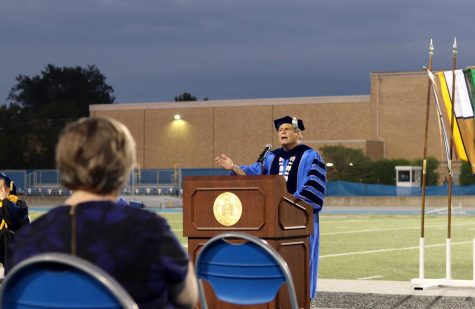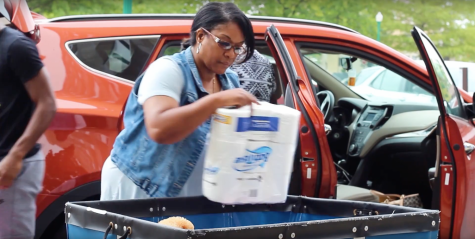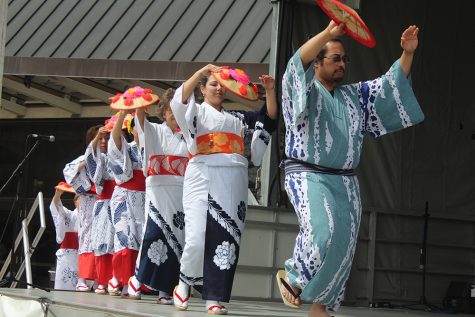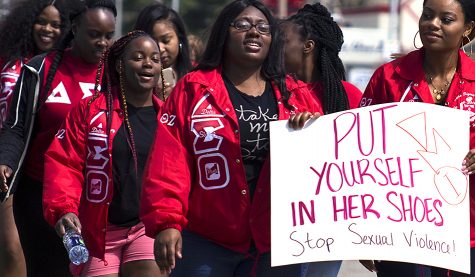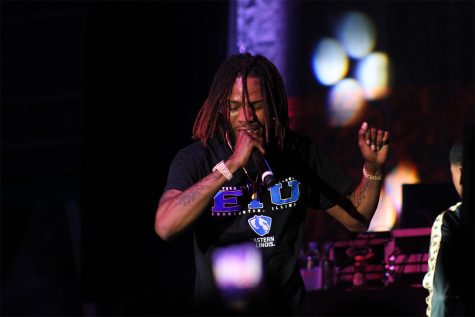Blackwell’s history at Eastern
When Anthony Blackwell came to Eastern, he had no idea that he would make history but he knew he wanted to be something great. In the summer of 1973, Blackwell made history by serving as the first African-American editor-in-chief of the Daily Eastern News, which was then called the Eastern News.
Blackwell grew up on the south side of Chicago. He attended Harlan High School and graduated in 1970. He chose to come to Eastern after an admissions counselor came to his high school to recruit black students.
There was a big difference in the population of Eastern in the ’70s. The campus had only 3,700 students. The majority of small town Charleston was white and so was the campus. So when Blackwell and other students came, it was a period of adjustment.
“I was among the first wave of black [students] recruited,” Blackwell said in a phone interview from his home in Chicago. “By time we came down there, it was of very few blacks on campus.”
For example, Blackwell recalls being the only minority in the classroom.
“It [was] a feeling of we’re getting to know each other but you get the feeling that people were kind of looking at you,” Blackwell said.
Sometimes racism would exist in the classroom.
“It was times when you felt like if you were between letter grades (for example a B and a C) you might get the lower of the two grades,” Blackwell said.
However, this did not stop ‘A’ students from becoming successful.
Being the minority on a primarily white campus made it necessary for blacks to bond together. Blackwell naturally bonded with the seven who came from Harlan; however, blacks already on campus welcomed them in.
“We did socialize and formed a bond,” Blackwell said. “Most of the established black students who were there encouraged incoming students to join the fraternities and sororities. The freshmen would get invited to parties called smokers. Blackwell became a Phi Beta Sigma in March 1971.”
Being a black student in the ’70s at Eastern was a time of change and adjustment. Blackwell arrived two years after the assassination of Dr. Martin Luther King Jr. It wasn’t an easy time for African-American students.
“It was an interesting time. It wasn’t a walk in the park,” Blackwell said.
He remembers when Eastern changed the name of the University Union to the Martin Luther King Jr. University Union. He remembered the sign being defaced a couple of times.
“It was a sense of resistance to change or resistance to the fact that the university would choose to honor MLK Jr.,” Blackwell said. “It was controversy about that, who did it and why. But that was the sign of the times.”
Also, most of the things that black students have now did not exist in the early ’70s or were just getting started. Bob Perry, a black student on campus, was responsible for coming up with the Black Student Union.
“There were other people that came up with BSU. I don’t think there was a black student union [when I arrived] because there were so little black students on campus,” Blackwell said. BSU was just getting its start in the 1970s.
During his stay here, Blackwell became very involved on campus and was very busy and well known. He became secretary of Phi Beta Sigma and also served as acting president of the fraternity. He was on BSU and worked on the student athletics boards.
Blackwell majored in sociology and minored in journalism. There wasn’t a journalism department until after he graduated. However, his love for journalism was apparent. He worked on his high school newspaper, the Harland Verdict, and yearbook, Harlan Falcons. He knew when he came to Eastern he wanted to pursue a newspaper career.
“I got into the books and learned how to adjust, to learn and apply myself,” said Blackwell. “I had a good attitude about the campus and university.”
He also was active at the Eastern News. He developed an interest in the field at an early age.
“I spent a lot of time with Blackwell. He was a heavy duty Eastern News kid,” said John David Reed, former student publications director.
Reed encouraged all his students to write for the Eastern News. However, he found something special in Blackwell.
“I became interested in journalism for as long as I can remember,” said Blackwell. When he was younger he was an avid reader and working on the newspaper and yearbook sealed the deal for him. “When I got down to EIU, I went straight to the Eastern News.”
Blackwell was a reporter, assistant news editor, assistant sports editor, sports editor (three quarters in a row), columnist and a DJ for WELH, a student radio station (now known as WEIU).
Blackwell remembered covering one of his biggest stories in sports. It was the 1972 Olympics and he covered Eastern alumni, John Craft, who was in the Olympics in Munich, Germany. Craft finished fifth in the triple jump.
While Blackwell was sports editor, he remembered a little controversy while writing his column “Black Ink.”
“Our basketball team wasn’t that good from ’72-’73 and I just was giving my honest opinion,” said Blackwell.
Another big story involved Diane Williams, a black student that ran for Homecoming queen in 1973 and lost to a woman from a white sorority. Williams was denied one-third of her vote total because she allegedly violated campaign rules while running for Homecoming queen. The committee took first place away from her and placed her in third. This angered many of the black students around Eastern. About 70 black students protested discrimination in front of Coleman Hall. Black football players, cheerleaders and Pink Panthers didn’t participate in the homecoming activities.
Since the student senate refused to investigate the election, Eastern’s president at the time, Gilbert Fite, got involved.
“The president of the university decided there wasn’t going to be a Homecoming queen, instead of choosing one over the other,” Blackwell said.
In the Eastern News, Williams was happy with Fite’s decision and the homecoming events went on as usual, but there was not Homecoming queen. However, much tension went on about the racism involved in the campaign. An anonymous letter to the editor was published that claimed, “Blacks ruined Homecoming weekend.”
Cheryl Johnson, a guest columnist, wrote an article about racism in the Eastern News. She explained that there are still injustices in the world against African-Americans and the election shows that racial prejudice still exists. However, the Eastern News wrote an editorial note that stood behind blacks and said it was unfair for Williams not to be Homecoming queen.
One of Blackwell’s influences was Reed, former adviser to Blackwell. Reed became adviser of the Eastern News in 1972. He came from the Chicago Sun Times where he was assistant managing editor.
“When he got here, he brought out the best in us,” Blackwell said. “The first two years for me was a struggle, but when Reed took over we were able to work magic together.”
As Blackwell spent more time at the Eastern News, his hard work and dedication finally paid off when he was announced as editor-in-chief of the Eastern News in the summer of 1973, which published twice a week.
“He had a good sense of journalism,” said Reed. “He knew how to manage the staff and he got along with everybody.”
Blackwell was editor for the 10 weeks of the summer. As editor, he said he tried to treat each issue fairly and not be biased.
“It can’t be all pro and no con and vise versa. The banner under the Eastern News says, ‘Tell the truth and don’t be afraid,’ and I followed that motto,” Blackwell said.
While working at the Eastern News, Blackwell bonded with his co-workers. He roomed with one of his friends, who was a photographer for the Eastern News.
He recalled sometimes missing class because they would be working in the newsroom, which was located in Pemberton, until midnight putting the newspaper together for the next day. Even though he was editor-in-chief, he sensed no superior or inferior attitudes.
“I’m really proud of that era. Things really came together,” Blackwell remembered.
“We were a bunch of hard-working student journalists trying to put out the best product we possibly could,” Blackwell said. “When you work that closely with people you develop friendships with each other. We came to like, respect and love each other.”
Blackwell graduated in May 1974. Even though the first couple of years were hard for Blackwell, he was determined to learn.
“I had to learn how to write in the right way. I learned so much and studied so hard.”
His proudest moment is looking back to see how far he had came.
“I was proud of where I looked back [to where I started] and wasn’t very good and I became good and rose through the ranks and was respected,” Blackwell said. Overall he was proud of his experience at the newspaper and at Eastern.
Blackwell still keeps in touch with Reed and other members of the Eastern News staff. Last year, he attended a retirement party for Reed.
“When I got the invitation from John Ryan that Reed was retiring, I said I was going to drop everything and get on I-57 and come on down,” Blackwell said. “I got to see friends that I worked with; that meant a whole lot to me.”
Blackwell spoke at Reed’s retirement dinner and said that being with the staff again felt like being with family. He looks back on where he started.
“It may start off as a period of adjustment and a period of attitude change, but once you come together and work, it’s beautiful.”
Overall, Blackwell has fond memories of Eastern and said that the good outweighed the bad.
“I’m proud that I was the first black editor of the Eastern News. It’s a special part of my life that will always be a special part of me.”




































